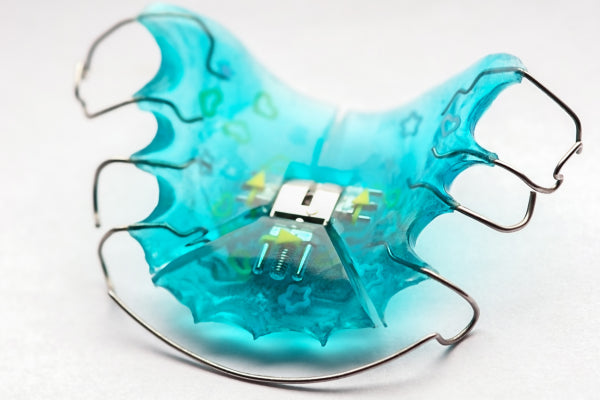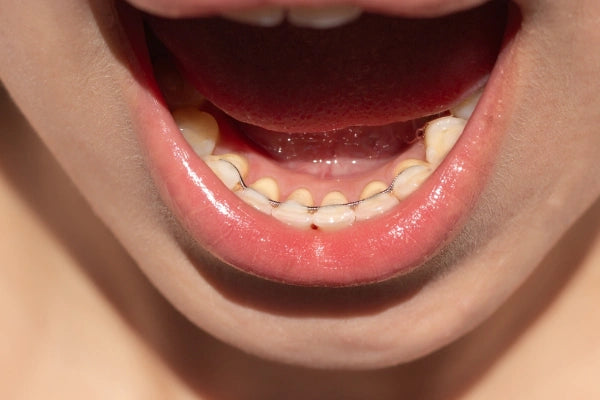
Table of Contents
- What Are Retainers?
- What Are the Types of Retainers
- Why Sleep with Clear Retainers In?
- Sleeping with a Clear Retainer: Is That Comfortable?
- Tips for Maintaining Clear Retainers for Maximum Comfort
- Potential Risks of Sleeping with Clear Retainers
- Preserve Your Smile with Aligner32
- So, Can You Wear Clear Retainers at Night?
- FAQS
Table of Contents
- What Are Retainers?
- What Are the Types of Retainers
- Why Sleep with Clear Retainers In?
- Sleeping with a Clear Retainer: Is That Comfortable?
- Tips for Maintaining Clear Retainers for Maximum Comfort
- Potential Risks of Sleeping with Clear Retainers
- Preserve Your Smile with Aligner32
- So, Can You Wear Clear Retainers at Night?
- FAQS
Congratulations on completing your journey with braces or clear aligners. You finally have that smile you’ve put great effort into achieving. But as your orthodontic treatment is coming to an end, another stage begins, and that is maintenance. One of the most common questions people ask about retainers is, “Can I sleep with clear retainers on?”
The short answer is yes, and you should! Clear retainers are an important step in maintaining your teeth in their final position, especially while you are sleeping. Nighttime is when teeth are most likely to shift, and wearing retainers while sleeping will help ensure that all of the hard work you have put in doesn’t go to waste.
In this blog, we will discuss everything you should know about getting those Zs with retainers in. We will discuss the types of retainers, the benefits and risks of sleeping with a retainer, and tips to make your retainer nighttime routine as easy and successful as possible.
What Are Retainers?
After orthodontic treatment, teeth naturally want to return to their natural position, this is called orthodontic relapse. The most effective way to prevent teeth from shifting back to their original position is by wearing retainers, which help hold them in place until the surrounding bone and tissues have fully adjusted and stabilized. Retainers are very important to make sure you have an amazing smile for a long time!
What Are the Types of Retainers
There are several types of retainers, each with its own benefits depending on the needs of the patient:
1. Clear Retainers

Clear retainers , which typically use clear plastic to ensure a low-profile fit, are nearly invisible, lightweight, and sit tightly over your teeth. Clear retainers are often highly regarded because of their snug design and overall comfort. These are popular because of their discreet look and comfort, making them ideal for overnight retainer use.
2. Hawley Retainers

These traditional retainers are made with metal wires and acrylic molded to fit your mouth. While they are durable and adjustable, they are more visible and bulkier compared to clear retainers.
3. Permanent (Bonded) Retainers

Permanent retainers are a thin wire bonded to the back of your upper or lower front teeth. As the name suggests, they are not removable without an orthodontist’s help and are great for long-term stabilization, particularly for your lower front teeth.
There is a place for each type of retainer, but the nighttime clear retainers are gaining popularity because of their aesthetics and ease of use.
Why Sleep with Clear Retainers In?
You might wonder, "Can you wear clear retainers at night, and is it necessary?" The truth is, nighttime is the most critical period for preventing your teeth from shifting. Here’s why:
Teeth Are Prone to Shifting
Even after your orthodontic treatment, your teeth are still settling into those new positions. If they’re not held in place with constant gentle pressure from a retainer while you are asleep, the teeth can move surprisingly fast, sometimes in just a few days.
Long Resting Periods
When you are asleep, you are inactive for six to eight hours (or more). This extended time of inactivity is sufficient for your teeth to begin moving back to their original position. Sleeping with retainers helps control this movement.
Supports Long-Term Results
Clear retainers help turn your new smile into a permanent solution by promoting the formation of new bone structure around your teeth following treatment. Not wearing a retainer overnight, even occasionally, will gradually undo much of what you’ve accomplished and may lead to needing additional corrective treatment.
By incorporating clear retainers into your retainer bedtime routine, you are ensuring the best chance for your teeth to stay perfectly aligned forever.
Sleeping with a Clear Retainer: Is That Comfortable?
Initially, nighttime clear retainers may feel a little different. You may also have some minimal tightness or mild soreness to get past. Neither of these sensations is uncommon and should typically subside within a few days to one week.
Advantages of Clear Retainers:
- Lightweight: They are designed to be worn at night while you sleep. Although retainers are thicker than aligners, they are still comfortable and do not interfere with your sleep.
- Snug fit: Clear retainers are made to exactly conform to the shape of your teeth, which makes them less bulky and noticeable than other types of retainers.
- Smooth surface: Clear retainers are smooth, without metal parts poking into your cheeks or gums making them the most comfortable option.
To use your retainer effectively and comfortably overnight, it should fit properly. So, if a clear retainer is causing excessive pain or is not fitting firmly or properly, check with your orthodontist and get it fixed.
Tips for Maintaining Clear Retainers for Maximum Comfort
Want to make wearing your clear retainers at night second nature? Here are some practical tips:
Build a Retainer Bedtime Routine
Treat your clear retainers like you would brushing and flossing. Make them a part of your nightly routine so that you won't forget. A consistent retainer bedtime routine will help limit those missed nights.
Keep Them Clean
It is important to clean dirty retainers because otherwise, they can lead to bad breath. Rinse your clear retainers every morning and evening with lukewarm water and gently brush them using a soft toothbrush. Avoid using hot water, which can warp the plastic.
Stay Hydrated
A dry mouth can make wearing clear retainers uncomfortable. Drink plenty of water during the day to promote natural saliva flow while sleeping.
Store Them Properly
Always use a protective case when you're not wearing your retainers. This prevents bacteria buildup and keeps them safe from accidental damage.
Communicate with Your Orthodontist
If you ever feel like your retainers aren't fitting well or are causing pain, please ask for an adjustment or replacement without thinking twice.
Following these steps can make sleeping with retainers feel automatic and help ensure that they are still functioning properly.
Potential Risks of Sleeping with Clear Retainers
While sleeping with clear retainers is generally safe and highly recommended, certain risks can arise if they are not properly maintained:
Bacterial Buildup
Failing to clean your retainers regularly can lead to bacterial accumulation, causing bad breath, cavities, or even oral infections.
Warping
Using hot water to clean your retainers or leaving them in a hot environment can cause them to warp. A distorted retainer won't fit properly, reducing its effectiveness and comfort.
Tooth Movement
Skipping nights or wearing ill-fitting retainers can allow teeth to shift, undermining your orthodontic treatment.
Damage
Clear retainers are durable but not indestructible. Cracks or holes can make them less effective. Regularly inspect your retainers for signs of wear and replace them if needed.
The key is simple: maintain good hygiene, wear your retainers consistently, and replace them when necessary to avoid these risks.
Preserve Your Smile with Aligner32
Following orthodontic treatment, it is important to maintain your new smile. The most effective plan to retain your new smile is with clear retainers made specifically for you by Aligner32 . We specialize in creating custom-made clear retainers. The custom-fit retainers are comfortable and effective for long-term use. Clear retainers are made of the highest-quality, medical-grade materials.
Why Choose Aligner32:
- Perfect Fit - Custom-made for your unique dental structure and preference.
- Best Materials - Aligner32 uses the highest-quality, BPA-free, and medical-grade materials, so you can trust these retainers will hold up.
- Convenience - An at-home impression kit and free shipping throughout the United States.
- Affordable - Aligner32 has several competitive options with prices as low as $145.
A custom-made Aligner32 retainer will help ensure the orthodontic results will last!
So, Can You Wear Clear Retainers at Night?
Absolutely! You can and should. Wearing clear retainers at night more often than not will provide the best long-term result for dental stability post-treatment. In fact, most orthodontists tell their patients to wear their retainers each night for at least a year after braces have been removed. Other dentists may ask you to wear your retainer at night for life, to be 100% sure your teeth stay perfect!
We know, it seems like a lot of effort, but the benefits are tremendous. You've already put effort into achieving your beautiful smile (time, money, and energy), so why not do a little bit more to protect it by incorporating a nightly habit?
FAQs
1. What happens if I only wear my retainer when I sleep?
If your orthodontist approves it, wearing your retainer only at night can be enough to maintain alignment. However, if worn less than prescribed, your teeth may gradually shift.
2. Do you have to wear clear retainers forever?
Most people need to wear retainers nightly for life to prevent teeth from shifting, although the exact duration depends on individual needs and your orthodontist’s advice.
3. Why can't I bite down with retainers?
Biting down can damage the retainer or cause discomfort because retainers aren't designed to withstand chewing pressure; they’re meant to hold teeth in place, not absorb force.
4. Can teeth move with a clear retainer?
If the retainer fits properly and is worn as directed, it prevents movement. But if it's worn inconsistently or doesn’t fit well, your teeth can still shift.
Citations:
Professional, C. C. M. (2025g, March 19). Teeth Retainer. Cleveland Clinic. https://my.clevelandclinic.org/health/treatments/10899-teeth-retainer
The Healthline Editorial Team. (2018, May 29). What to know before you get a retainer. Healthline.https://www.healthline.com/health/retainer-types


